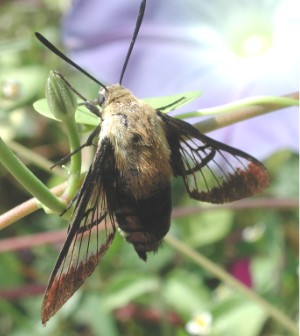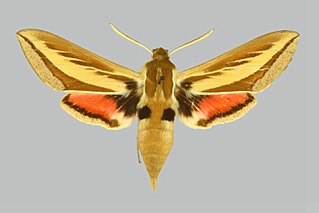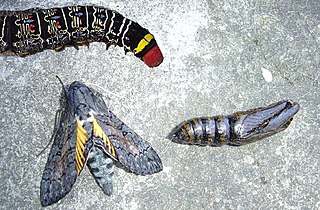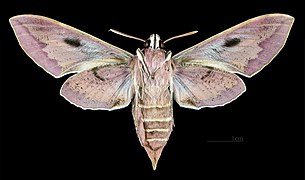
The genus Deilephila is part of the family Sphingidae, the hawk-moths or sphinxes. The genus was erected by Jakob Heinrich Laspeyres in 1809. It consists of a small number of Palearctic species most of which have common names involving the phrase "elephant hawk moth". They include the elephant hawk moth, Deilephila elpenor; the small elephant hawk moth and the Chitral elephant hawk moth. The oleander hawk moth is sometimes classified in this genus as D. nerii, but sometimes treated in genus Daphnis.

Hemaris is a genus of sphinx moths in the subfamily Macroglossinae, which is native to the Holarctic. Their main host plants are herbs and shrubs of the teasel and honeysuckle families. Moths in genus Hemaris are known collectively as clearwing moths or hummingbird moths in the US and Canada and bee hawk-moths in Britain. The related Old World hummingbird hawk-moths, genus Macroglossum, are similar in appearance and habits. Both genera have tails that are provided with an expansile truncated tuft of hairs, but only Hemaris has the disc of the wings transparent, as these scales are dropped soon after eclosion.

Hyles hippophaes, the seathorn hawk-moth, is a species of moth in the family Sphingidae. The species was first described by Eugenius Johann Christoph Esper in 1789.

Hyles dahlii is a moth of the family Sphingidae first described by Carl Geyer in 1828.

Hyles nicaea, the Mediterranean hawk-moth, is a moth of the family Sphingidae. The species was first described by Leonardo de Prunner in 1798.

Hyles is a genus of moths in the family Sphingidae.

Euchloron is a monotypic moth genus of the family Sphingidae first described by Jean Baptiste Boisduval in 1875. Its only species, Euchloron megaera, the verdant hawk, is known from most of Africa and Yemen. It is a migratory species.

Hyles zygophylli, the bean-caper hawkmoth, is a moth of the family Sphingidae. The species was first described by Ferdinand Ochsenheimer in 1808. It is found in western and eastern Turkey, Armenia, eastern Transcaucasia, Daghestan, northern Syria, northern Iran, Turkmenistan, Kazakhstan, Uzbekistan, Kyrgyzstan, Tajikistan and northern Afghanistan. It is also found from western, northern and central Xinjiang province east to Shaanxi province and north to Mongolia. There is one record of a vagrant from Croatia.

Hyles stroehlei, the Hindu Kush hawkmoth, is a moth of the family Sphingidae. It is only known from the Hindu Kush mountains and Kohistan, Swat, Pakistan. The wingspan is 55–70 mm. Adults are on wing from late June to early July. The species was first described by Ulf Eitschberger, Fritz Danner and Bernhard Surholt in 1998.

Hyles perkinsi, or Perkin's sphinx, is a species of moth of the family Sphingidae. It was described by Otto Herman Swezey in 1920. It is endemic to the Hawaiian islands of Oahu and Molokai.

Hyles sammuti is a moth of the family Sphingidae. Kitching and Cadiou (2000) treat it as a valid species, while Pittaway treats it as a subspecies of Hyles tithymali, seeing the larvae are very similar to Hyles tithymali mauretanica. Based on studies of the mitochondrial DNA, Hyles sammuti probably hybridises with Hyles euphorbiae. It is known from Malta, but there are closely related populations found on Sicily and southern Italy, which might prove to be the same species.

Hyles x apocyni is a moth of the family Sphingidae. It is known from Tajikistan and Turkmenistan.

Hyles centralasiae, the eastern foxtail-lily hawkmoth, is a moth of the family Sphingidae. The species was first described by Otto Staudinger in 1887. It is found from eastern Turkey and Armenia east across northern Iraq, northern Iran, southern Turkmenistan, the mountainous areas of eastern Uzbekistan and southern Kazakhstan to Tajikistan, Kyrgyzstan, Afghanistan and northern Xinjiang in China.

Hyles robertsi, the spurge hawkmoth, is a moth of the family Sphingidae. The species was first described by Arthur Gardiner Butler in 1880. It is known from Iran, the Kopet Dag Mountains of Turkmenistan, eastward to central and eastern Afghanistan, Kashmir and the Pamirs. It is also known from western Pakistan. Some authors consider it to be a subspecies of Hyles euphorbiae.

Rhodafra opheltes is a moth of the family Sphingidae. It is known from South Africa.

Hemaris ducalis, the Pamir bee hawkmoth, is a moth of the family Sphingidae. It is known from the mountains of south-western Xinjiang in China, the western Tian Shan, southern and eastern Kazakhstan up to the Altai Mountains, western Mongolia, southern Uzbekistan, Kyrgyzstan, Tajikistan, northern Afghanistan and Pakistan.

Isognathus caricae is a moth of the family Sphingidae. It is known from Costa Rica, French Guiana, Bolivia, Argentina and Brazil.

Laothoe philerema, the Pamir poplar hawkmoth, is a moth of the family Sphingidae. The species was first described by Alexander Michailovitsch Djakonov in 1923. It is known from eastern Turkmenistan, southern Uzbekistan, Tajikistan and eastern Afghanistan.





















